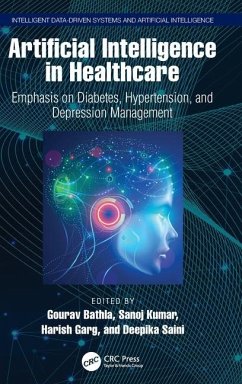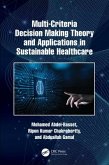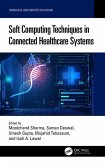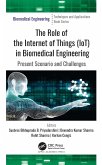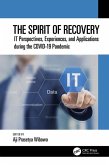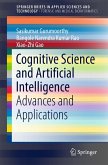Artificial Intelligence in Healthcare
Emphasis on Diabetes, Hypertension, and Depression Management
Herausgeber: Bathla, Gourav; Saini, Deepika; Garg, Harish; Kumar, Sanoj
Artificial Intelligence in Healthcare
Emphasis on Diabetes, Hypertension, and Depression Management
Herausgeber: Bathla, Gourav; Saini, Deepika; Garg, Harish; Kumar, Sanoj
- Gebundenes Buch
- Merkliste
- Auf die Merkliste
- Bewerten Bewerten
- Teilen
- Produkt teilen
- Produkterinnerung
- Produkterinnerung
This book presents state-of-the-art research works for a better understanding of the advantages and limitations of AI techniques in the field of healthcare. It will further discuss artificial intelligence applications in depression, hypertension and diabetes management.
Andere Kunden interessierten sich auch für
![Multi-Criteria Decision Making Theory and Applications in Sustainable Healthcare Multi-Criteria Decision Making Theory and Applications in Sustainable Healthcare]() Mohamed Abdel-BassetMulti-Criteria Decision Making Theory and Applications in Sustainable Healthcare174,99 €
Mohamed Abdel-BassetMulti-Criteria Decision Making Theory and Applications in Sustainable Healthcare174,99 €![Federated Deep Learning for Healthcare Federated Deep Learning for Healthcare]() Federated Deep Learning for Healthcare153,99 €
Federated Deep Learning for Healthcare153,99 €![Soft Computing Techniques in Connected Healthcare Systems Soft Computing Techniques in Connected Healthcare Systems]() Soft Computing Techniques in Connected Healthcare Systems175,99 €
Soft Computing Techniques in Connected Healthcare Systems175,99 €![The Role of the Internet of Things (IoT) in Biomedical Engineering The Role of the Internet of Things (IoT) in Biomedical Engineering]() The Role of the Internet of Things (IoT) in Biomedical Engineering186,99 €
The Role of the Internet of Things (IoT) in Biomedical Engineering186,99 €![The Spirit of Recovery The Spirit of Recovery]() The Spirit of Recovery154,99 €
The Spirit of Recovery154,99 €![Cognitive Science and Artificial Intelligence Cognitive Science and Artificial Intelligence]() Sasikumar GurumoorthyCognitive Science and Artificial Intelligence41,99 €
Sasikumar GurumoorthyCognitive Science and Artificial Intelligence41,99 €![Advancing Healthcare Through Data-Driven Innovations Advancing Healthcare Through Data-Driven Innovations]() Advancing Healthcare Through Data-Driven Innovations165,99 €
Advancing Healthcare Through Data-Driven Innovations165,99 €-
-
-
This book presents state-of-the-art research works for a better understanding of the advantages and limitations of AI techniques in the field of healthcare. It will further discuss artificial intelligence applications in depression, hypertension and diabetes management.
Hinweis: Dieser Artikel kann nur an eine deutsche Lieferadresse ausgeliefert werden.
Hinweis: Dieser Artikel kann nur an eine deutsche Lieferadresse ausgeliefert werden.
Produktdetails
- Produktdetails
- Verlag: CRC Press
- Seitenzahl: 308
- Erscheinungstermin: 23. Oktober 2024
- Englisch
- Abmessung: 234mm x 156mm x 19mm
- Gewicht: 640g
- ISBN-13: 9781032620190
- ISBN-10: 1032620196
- Artikelnr.: 70524189
- Herstellerkennzeichnung
- Libri GmbH
- Europaallee 1
- 36244 Bad Hersfeld
- gpsr@libri.de
- Verlag: CRC Press
- Seitenzahl: 308
- Erscheinungstermin: 23. Oktober 2024
- Englisch
- Abmessung: 234mm x 156mm x 19mm
- Gewicht: 640g
- ISBN-13: 9781032620190
- ISBN-10: 1032620196
- Artikelnr.: 70524189
- Herstellerkennzeichnung
- Libri GmbH
- Europaallee 1
- 36244 Bad Hersfeld
- gpsr@libri.de
Gourav Bathla is working as Associate Professor at GLA University, India. He has 17 years of teaching and research experience. He has completed PhD from Punjabi University, Punjab, India. He has completed M.E from Delhi College of Engineering,India. He is GATE qualified with All India Rank 59. He is an active researcher and published 25 research papers in reputed Journals and 10 research papers in International Conferences. He has published 4 patents. His areas of interest are Big Data, Machine Learning, Deep Learning, NLP, and Programming Languages. He is reviewer of various Journals such as Engineering Applications of Artificial Intelligence, Scientific Reports, Journal of Supercomputing, Online Information Review, IAES International Journal of Artificial Intelligence etc. and TPC member of various International Conferences. Sanoj Kumar works as an assistant professor (SG) at the University of Petroleum and Energy Studies, Dehradun, Uttarakhand, India. Earlier, he worked as a postdoctoral fellow with the Department of Mathematics and Computer Science, University of Udine, Italy, from October 2013 to September 2014. He completed his PhD in mathematics from IIT Roorkee, India, in 2013. Dr. Kumar's research interests include image processing, computer vision, and machine learning. He has authored more than 22 papers published in refereed international journals and conferences, including those from Elsevier, Springer, Taylor & Francis, etc. He has also authored two book chapters. He is a reviewer for various journals such as ISA Transactions (Elsevier), IET Image Processing, Optical Engineering (SPIE), Applied Mathematical Modeling (Elsevier), etc. He also got the best paper and young scientist awards in NETCRYPT 2020. His teaching area includes Engineering Mathematics I, Engineering Mathematics II, discrete mathematics, graph theory, optimization techniques, numerical analysis, linear algebra, probability and statistics, real analysis, complex analysis, differential equation etc. Harish Garg is working as an Associate Professor at Thapar Institute of Engineering & Technology, Deemed University, Patiala, Punjab, India. He is ranked in the World's Top 2% Scientist List and Rank #1 in India & World Rank #229 published by Stanford University in the consecutive three years 2020, 2021, 2022. He is the recipient of the Obada-Prize 2022 - Young Distinguished Researchers. He is also the recipient of the Top-Cited paper by an India-based author (2015 - 2019) from Elsevier Publisher. He also serves as an advisory board member of the Universal Scientific Education and Research Network (USERN). Dr. Garg's research interests include Computational Intelligence, Multi-criteria decision making, Evolutionary algorithms, Reliability analysis, Expert systems and decision support systems, Computing with words and Soft Computing. He has authored more than 410 papers (over 360 are SCI) published in refereed International Journals including IEEE Transactions, Elsevier, Springer etc. He has also authored seven book chapters. Also, he edited 8 books from Elsevier, Springer and other publishers. His Google citations are over 18240 with H-index- 76. Dr. Garg also serves on editorial boards of several leading international journals, this includes the Founding Editor-in-Chief of the Journal of Computational and Cognitive Engineering. He is also the Associate Editor of IEEE Transaction of Fuzzy Systems, Soft Computing, Alexandria Engineering Journal, Journal of Intelligent & Fuzzy Systems, Complex and Intelligent Systems, Journal of Industrial & Management Optimization, CAAI Transactions on Intelligence Technology, etc. For more details about him, kindly follow his webpage https://sites.google.com/site/harishg58iitr/home. Deepika Saini is an assistant professor at Graphic Era (deemed to be) University, Dehradun, Uttarakhand, India. Previously, in 2016, she received her Ph.D. in Mathematics from IIT Roorkee in India. She completed her M.Sc. in Mathematics from H.N.B. Garhwal University, Srinagar, Uttarakhand, India. She won the gold medal for securing first place among all PG students in her M.Sc. in 2005. Dr. Saini's research interests include computer vision, image processing, computer graphics, and their applications in various branches of engineering. She has published more than 16 papers in various international journals and reputed conferences, including those of Elsevier, Springer, Taylor & Francis, etc. She has also authored a book chapter. She also got the best paper award in NETCRYPT 2020. Her teaching area includes Mathematics I, Mathematics II, Mathematics III, discrete mathematics, computer based numerical and statistics techniques, linear programming, numerical analysis, linear algebra, algebra, differential equation etc.
1. Artificial Intelligence and Digital Health Twin Applications in
Healthcare - A Systematic Review. 2. Early Detection of Diabetic Foot
Ulcers Using Optical Flow Based Ensemble Learning CNN Framework. 3.
Identification of potential biomarkers for diabetes mellitus using Gene
expression datasets, Machine learning, and R packages to predict the risk
for diabetes. 4. Machine learning for chronic diseases. 5. AI Chatbot For
Diabetes Self-Help. 6. . 7. 8. Machine learning techniques for prediction
of hypertension. 9. Food recommendation for hypertensive persons. 10.
Optimized Support Vector Machines for Detection of Mental Disorders. 11.
Artificial Intelligence Applications in depression management. 12.
Depression Prediction Using Machine Learning Techniques. 13. Future of
depression management using Artificial Intelligence. 14. AI chatbot for
depression self-help. 15. Artificial Intelligence in Healthcare: Futuristic
Opportunities.
Healthcare - A Systematic Review. 2. Early Detection of Diabetic Foot
Ulcers Using Optical Flow Based Ensemble Learning CNN Framework. 3.
Identification of potential biomarkers for diabetes mellitus using Gene
expression datasets, Machine learning, and R packages to predict the risk
for diabetes. 4. Machine learning for chronic diseases. 5. AI Chatbot For
Diabetes Self-Help. 6. . 7. 8. Machine learning techniques for prediction
of hypertension. 9. Food recommendation for hypertensive persons. 10.
Optimized Support Vector Machines for Detection of Mental Disorders. 11.
Artificial Intelligence Applications in depression management. 12.
Depression Prediction Using Machine Learning Techniques. 13. Future of
depression management using Artificial Intelligence. 14. AI chatbot for
depression self-help. 15. Artificial Intelligence in Healthcare: Futuristic
Opportunities.
1. Artificial Intelligence and Digital Health Twin Applications in
Healthcare - A Systematic Review. 2. Early Detection of Diabetic Foot
Ulcers Using Optical Flow Based Ensemble Learning CNN Framework. 3.
Identification of potential biomarkers for diabetes mellitus using Gene
expression datasets, Machine learning, and R packages to predict the risk
for diabetes. 4. Machine learning for chronic diseases. 5. AI Chatbot For
Diabetes Self-Help. 6. . 7. 8. Machine learning techniques for prediction
of hypertension. 9. Food recommendation for hypertensive persons. 10.
Optimized Support Vector Machines for Detection of Mental Disorders. 11.
Artificial Intelligence Applications in depression management. 12.
Depression Prediction Using Machine Learning Techniques. 13. Future of
depression management using Artificial Intelligence. 14. AI chatbot for
depression self-help. 15. Artificial Intelligence in Healthcare: Futuristic
Opportunities.
Healthcare - A Systematic Review. 2. Early Detection of Diabetic Foot
Ulcers Using Optical Flow Based Ensemble Learning CNN Framework. 3.
Identification of potential biomarkers for diabetes mellitus using Gene
expression datasets, Machine learning, and R packages to predict the risk
for diabetes. 4. Machine learning for chronic diseases. 5. AI Chatbot For
Diabetes Self-Help. 6. . 7. 8. Machine learning techniques for prediction
of hypertension. 9. Food recommendation for hypertensive persons. 10.
Optimized Support Vector Machines for Detection of Mental Disorders. 11.
Artificial Intelligence Applications in depression management. 12.
Depression Prediction Using Machine Learning Techniques. 13. Future of
depression management using Artificial Intelligence. 14. AI chatbot for
depression self-help. 15. Artificial Intelligence in Healthcare: Futuristic
Opportunities.

